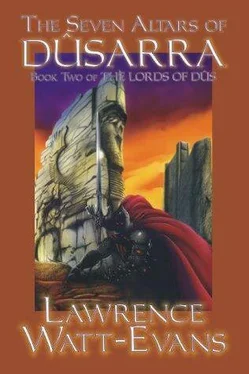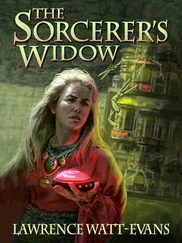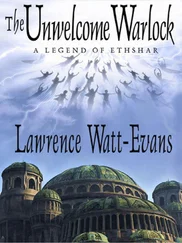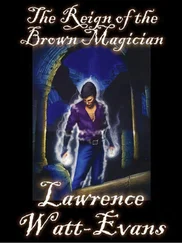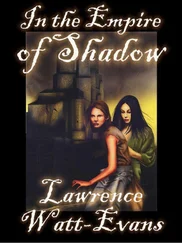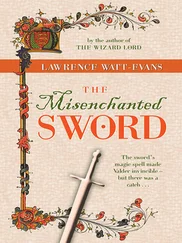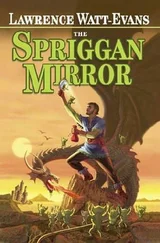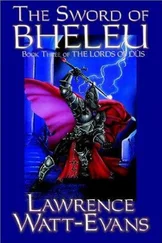Lawrence Watt-Evans - The Seven Altars of Dusarra
Здесь есть возможность читать онлайн «Lawrence Watt-Evans - The Seven Altars of Dusarra» весь текст электронной книги совершенно бесплатно (целиком полную версию без сокращений). В некоторых случаях можно слушать аудио, скачать через торрент в формате fb2 и присутствует краткое содержание. Жанр: Фэнтези, на английском языке. Описание произведения, (предисловие) а так же отзывы посетителей доступны на портале библиотеки ЛибКат.
- Название:The Seven Altars of Dusarra
- Автор:
- Жанр:
- Год:неизвестен
- ISBN:нет данных
- Рейтинг книги:3 / 5. Голосов: 1
-
Избранное:Добавить в избранное
- Отзывы:
-
Ваша оценка:
- 60
- 1
- 2
- 3
- 4
- 5
The Seven Altars of Dusarra: краткое содержание, описание и аннотация
Предлагаем к чтению аннотацию, описание, краткое содержание или предисловие (зависит от того, что написал сам автор книги «The Seven Altars of Dusarra»). Если вы не нашли необходимую информацию о книге — напишите в комментариях, мы постараемся отыскать её.
The Seven Altars of Dusarra — читать онлайн бесплатно полную книгу (весь текст) целиком
Ниже представлен текст книги, разбитый по страницам. Система сохранения места последней прочитанной страницы, позволяет с удобством читать онлайн бесплатно книгу «The Seven Altars of Dusarra», без необходимости каждый раз заново искать на чём Вы остановились. Поставьте закладку, и сможете в любой момент перейти на страницу, на которой закончили чтение.
Интервал:
Закладка:
SH is pronounced as in sheep.
ZH is pronounced like z in azure.
A final note on the names of the gods: Eramman is a declined language with seven cases; all nouns will ordinarily have an ending indicating their case and what part of a sentence they are. Names, however, do not have endings, ever. The names of the gods are, for the most part, simply words indicating their provenance with endings removed. Thus aghadye, the nominative form of the word for "loathing," becomes Aghad, and bheluye, meaning "destruction," becomes Bheleu (yes, it should be bheleuye or Bhelu; a few centuries earlier it was bheleuye, but pronunciations change).
Native speakers would not find this confusing, nor tend to identify a god too strongly with the single trait his name represents, because they are accustomed to names with root meanings that may not have much to do with the things named. For examples of similar attitudes among speakers of English, consider the names Grace and Victor; no one assumes that every woman named Grace is in fact graceful, or that every man named Victor is a successful fighter. How many people, upon hearing the name New York, even remember that there is an old York?
Furthermore, many of the root-words have changed meaning or dropped out of common usage; regvosye, meaning an unwillingness to understand, is extremely archaic, and no longer used as the ordinary word for blindness. That is just one example of many.
NOTES ON ERAMMAN MYTH AND THEOLOGY
In the beginning, according to the myths of Eramma and Nekutta, there was nothing at all except Dagha, and a nothingness far more complete than is ordinarily considered. There was no time, no space, no matter, no energy, no life, no death, nothing at all. Dagha, existing without these things, is therefore totally incomprehensible; it is customary to refer to Dagha as "he," but actually there is no way of saying whether he is male, female, neither, or both.
In some way, this incomprehensible being created time and space; however, being outside time himself, he could not directly interfere or manipulate anything within the space he had created. For that reason, there is no cult of Dagha, no worship, and no prayer to him.
Not satisfied with an empty cosmos, Dagha also created beings that could manipulate it, beings that were within time and limited by it, but were still immortal and unconfined by space. These beings were the gods.
Since they were created from nothing, they were of necessity created in pairs, each the negation of its twin. In each pair there was a god dedicated to the elaboration and ornamentation of the cosmos, and another dedicated to returning to primordial nothingness. Dagha created seven pairs in all; the seven dedicated to creation are known as the Lords of Eir (from an archaic word meaning both "tree" and "vitality"), and their seven foes are known as the Lords of Dыs (from dusye, meaning "death" and also "darkness").
The first pair created are usually referred to by their attributes rather than their names, Life and Death; they do have names, however. The role of Ayvi, the god of life, is frequently misunderstood; he is not in any way a preserver of life, but merely its bestower. He brings the first spark to each seed or embryo, but nothing more; and the Final God does nothing but remove that spark.
The next creation was of four gods rather than two: Aal, god of growth and fertility, countered by P'hul, goddess of decay; and Bel Vala, god of strength and preservation, countered by Bheleu, god of destruction. Aal is generally given precedence over Bel Vala, but P'hul is considered inferior to Bheleu; the reasons for this apparent contradiction are unclear.
The next creation was again of four gods, but this time there was no confusion in rank; Aghad, god of hatred, fear, and loathing, and his sister Pria, goddess of love, peace, and friendship, are universally acknowledged as mightier than Sai, goddess of sorrow and despair, and Gau, goddess of pleasure and delight.
These ten are the High Gods; their four younger siblings are considered lesser, but therefore more accessible, deities. The sixth pair is Leuk, lord of light and bringer of inspiration, and Andhur Regvos, the god of darkness and blindness.
The seventh and final pair of Eir and Dыs are Tema, goddess of night, and Amera, goddess of the day. With the creation of these two Dagha either exhausted his power or lost interest.
These fourteen gods amongst them created the world, to provide themselves with an arena in which to manifest themselves; and in the early days of their creation, in emulation of their master, they created lesser gods.
All the various cults of Nekutta and Eramma agree thus far, with the exception of a few outcast religions and followers of obscure deities; however, there is virtually no agreement as to the existence, number, and nature of these lesser gods, who are actually the objects of most worship, the Eir and Dыs being considered too powerful to waste time on mere mortals.
Most of the lesser gods are collectively classed as Arkhein, a word of unknown origin, and there are dozens, perhaps hundreds, of them, including among the more prominent Savel Skai, the sun-god; Mel, goddess of the moon; Eramma the earth-mother; Koros, god of war; Melith, goddess of storms and lightning, and her brother, (or half-brother, or son, or cousin, depending on which cult one adheres to) Kewerro, the god of wind and air, particularly the north wind and storms at sea. Others range down through such minor powers as Eknissa, the firegoddess, to the obscure and pointless, such as Quon, god of dogs, and Bugo, god of masculinity and petty aggression.
A popular pastime in some areas is to debate the pedigrees of the various Arkhein, a diversion not readily exhausted, since despite the sexes generally attributed to the various deities it is assumed that any Eir or Dыs can mate with any other and produce offspring, or that any one can by himself or herself produce a child. Furthermore, the Arkhein themselves are fertile; Eramma is generally considered the mother of most of the minor nature-gods, though their paternities (if any) are debatable.
It is no wonder that, confronted with such a tangle, most overmen prefer to assume that no gods exist at all.
Интервал:
Закладка:
Похожие книги на «The Seven Altars of Dusarra»
Представляем Вашему вниманию похожие книги на «The Seven Altars of Dusarra» списком для выбора. Мы отобрали схожую по названию и смыслу литературу в надежде предоставить читателям больше вариантов отыскать новые, интересные, ещё непрочитанные произведения.
Обсуждение, отзывы о книге «The Seven Altars of Dusarra» и просто собственные мнения читателей. Оставьте ваши комментарии, напишите, что Вы думаете о произведении, его смысле или главных героях. Укажите что конкретно понравилось, а что нет, и почему Вы так считаете.
